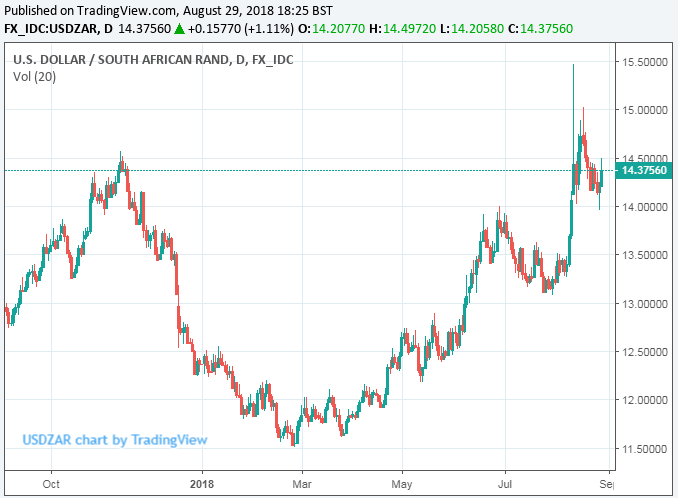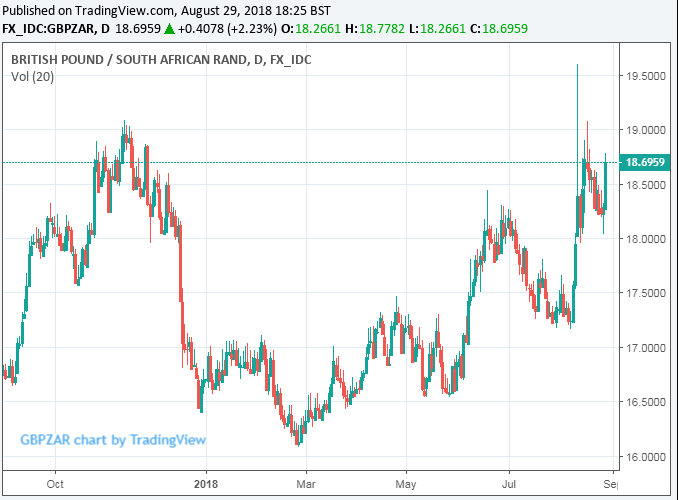South African Rand's Outlook Plagued by Potential for Significant Volatility as Country Approaches Elections
- Written by: James Skinner
- ZAR volatility rises as angst over land reform programme persists.
- Analysts say reforms will weigh further on Rand in months ahead.
- US-China tariffs also sit before ZAR like iceberg in September road.

© Adobe Stock
The Rand has been volatile this week as markets digest the latest events around President Cyril Ramaphosa's controversial land reform programme, and analysts say more of the same can be expected over the medium-term.
The currency remains subject to bouts of notable volatility, the most recent coming after South Africa's parliament withdrew a 2016 bill designed to enable a quicker but more forceful approach to land reform.
The bill sought to end the "willing buyer, willing seller" model by enabling the government to expropriate land from farmers after a price had been determined by a government adjudicator.
The move caused the Rand to whipsaw between the 14.00 and 14.20 levels against the US Dollar, with similar volatility seen against the Pound, which dipped down towards 18.00 before recovering back to 18.30.

About: USD/ZAR rate shown at daily intervals.
"The retraction of the Bill sparked an exaggerated response, reflecting the extent of investor angst over the issue of land expropriation without compensation," says Nema Ramkhelawan-Bhana, head of research at Rand Merchant Bank. "This type of reaction might well become commonplace ahead of the 2019 general elections as there are concerns that decisive action on high-profile amendments will be delayed."
The ruling African National Congress and a majority in South Africa's parliament passed a resolution in South Africa's parliament on February 28 that, in part, reads; "With the concurrence of the National Council of Provinces (NCOP) instruct the Constitutional Review Committee to review section 25 of the Constitution and other clauses where necessary to make it possible for the state to expropriate land in the public interest without compensation.
The Expropriation Act was designed to placate the radical Economic Freedom Fighters grouping of the parliament but will require wholesale constitutional change that not only casts Ramaphosa's grip on power in a much weaker light, but also places a question mark directly over South Africa's commitment to private property rights. President Ramaphosa confirmed earlier in August that the government will push ahead with the reforms.
President Donald Trump hit out at the expropriation plan soon after in a post on Twitter soon after, saying he has asked Secretary of State Mike Pompeo to study the plan. This intervention came after Fox News reported that the South African government is "seizing land from white farmers", which itself followed closely on the heels of a Cato Institute report calling for US action.
"The short term drop of USD-ZAR towards 14.00 was caused by domestic news which stated that the legislation proposal on land expropriation had been withdrawn. However, USD-ZAR immediately jumped back again when it became clear that the subject of expropriation of land without compensation will remain on the agenda. Regardless of the legislation proposal there is currently an on-going review of clause 25 of the constitution," says Elisabeth Andreae, an analyst at Commerzbank.
Advocates of the land expropriations say it is necessary to provide enough opportunity to black would-be farmers, often citing a severe racial disparity in the ownership of farming land that they claim is the result of South Africa's apartheid system and time as an imperial possession.
Critics say it has negative implications for human and private property rights, while also claiming it could deter investment from South Africa's struggling economy. There is local precedent for such adverse outcomes, established most recently in neighbouring Zimbabwe.
President Ramaphosa is under popular pressure to demonstrate progress on the reforms ahead of a general election that is expected to be held some time in the first half of 2019. As a result, most analysts doubt this week will have been the last time the Rand takes a dive following headlines about the land programme.

Above: Pound-to-Rand rate shown at daily intervals.
"Trump's tweet merely adds to the headwinds facing the rand. These headwinds are blowing out of Washington, where: i) a Fed shifting monetary policy to neutral if not tight and ii) US economic sanctions are starting to weigh on South Africa's biggest trade partner, China," says Chris Turner, global head of strategy at ING Group.
Turner says that if the White House decides to follow through on an earlier threat to impose a 25% tariff on another $200 bn of Chinese exports to the US this September, the emerging market currency complex could come under even further pressure.
Emerging market currencies have already been hurt in 2018 by a stronger US Dollar and market fears over what President Trump's "trade war" with China will mean for the global economy.
The USD/ZAR rate is up more than 16% this year, but has actually risen further than this in recent months because the exchange rate gained nearly 10% in the first two months of the year.
"So even though the rand looks to be cheap and has an implied yield of 7% per annum through the three month forwards, we're more worried that USD/ZAR has to trade to the 15.50 area first."
The USD/ZAR rate was quoted 1.29% higher at 14.38 around the London close Wednesday while the Pound-to-Rand rate was 1.03%% higher at 18.70.
Advertisement
Get up to 5% more foreign exchange by using a specialist provider to get closer to the real market rate and avoid the gaping spreads charged by your bank when providing currency. Learn more here




